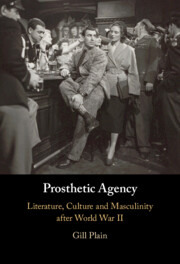Chapter 1 - Enabling Machines
Hammond Innes, Nevil Shute and Technologies of Rehabilitation
from Part I - Technology
Published online by Cambridge University Press: 29 June 2023
Summary
As the remarkable rehabilitation of Sammy Rice suggests, the late 1940s and early 1950s are characterised by a representational crisis in which cinema and popular fiction struggled to reconceptualise the hero. In the case of The Small Back Room, the belated redeployment of military masculinity seems singularly ill-suited to the demands of ‘peace’, when the comforts, purpose and prestige of uniform are exactly what are missing from many men’s lives. But there were other residual combat contexts and identities that seemed to offer more hope of adaptation, chief among them, flight. For writers and filmmakers seeking to re-empower their disorientated demobilised protagonists, the pilot’s agency – his ability literally and metaphorically to rise above the deadening disappointments of the postwar – was immensely attractive. Poised on the brink of a new era of commercial aviation, flight set the potential for romance alongside a still clearly recognisable danger, and the pilot himself represented an ideal means of combining traditional heroic qualities of skill and risk with a non-martial, even domestic, modernity. The pilot also offered the possibility of building on the power of an iconic figure, the Battle of Britain hero, who – as mythology would have it – embodied an older, more chivalric mode of combat, and was thus less compromised than his soldier compatriot by the barbaric residue of war. As with all myths, this one is partial and illusory: the wartime pilot was, Martin Francis notes in his study of British culture and the Air Force, as much psychopath as poet, an agent of destruction and an ‘omnipotent’ superman rising above the mere mass of mankind.1 Nonetheless, these twin conceptions of the pilot suggest the potential for a new hybrid hero combining nostalgia and modernity – and the sheer number of narratives featuring flight-related protagonists indicates the appeal of and desire for such a hero – but the pilot as avatar of modernity is also a profoundly ambivalent figure, carrying with him a threat that exceeds the boundaries of the human. Technology, in the postwar, whether mediated through the pilot or through other scientist and engineer figures, is always simultaneously blessing and curse. It offers unparalleled man-making opportunities at the same time as it threatens the very annihilation of mankind.
- Type
- Chapter
- Information
- Prosthetic AgencyLiterature, Culture and Masculinity after World War II, pp. 55 - 80Publisher: Cambridge University PressPrint publication year: 2023



